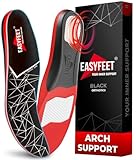Best Shoes & Best Insoles
Podiatrist Recommended Work Boots [BEST Work Boots]
Do you want the best men’s work boots? We show the BEST Podiatrist recommended men’s work boots: Cowboy boots, Leather Boots & Steel Boots!
Look!
- The BEST work boots need to protect and be comfortable.
- We review work boots recommended by podiatrists.
- We then show the best work boot orthotics to use with your boot.
So Let’s GO!
Table of Contents
What Makes a Good Work Boot:
Protection is priority #1 but comfort is #1B
We go over our favorite work boots for foot pain!
Podiatrist Recommended Criteria:
- Durable outsole to have great grip and provide the best traction.
- Slip resistance for wet conditions.
- Seam sealed waterproof construction.
- Padded tongue and collars.
- Room for a removable pre-made or EVA orthotic.
- Firm shank embedded in the midsole with possible rocker bottom for walking.
Podiatrist Recommended Criteria:
Comfortable Boots:
With a strong outsole it will take more pressure off of your foot.
It must have room for a strong insole within the shoe to take pressure off of the foot.
Protection:
- Any podiatrist recommended boot must need a great sense of protection to your toes and ankles.
- We look at taller boots that protect your ankle from rolling or spraining.
- We also look at protection on your toes to prevent them from being crushed.
Durability:
- We want to focus on picking a shoe that will last.
- All of the shoes that we reviewed last for a reasonable period of time, especially relative to the cost.
How to Choose a Work Boot by Foot Type:
The APMA gives a criteria for choosing a work boot based on foot type:
High Arch Foot Type:
With a high arch foot type (Supinated Foot), a shoe that is more focused on flexibility and cushion can be best.
This is because a high arched or supinated foot cannot compensate for impact as well.
A Flat Foot Type:
A flat foot type (Over Pronation Foot) is almost too good at flattening out. This means the arch and the inside of the ankle are stretched and overworked.
This type of foot would benefit most from support and correction.
A taller boot with a stronger insole and shoe would work best in this case.
A Neutral Foot Type:
This type of foot would benefit most from both support and cushion.
Luckily most new good shoe types can allow for this!
The Best Work Boots Recommended By Podiatrists:
Below we go over the best work boots recommended by podiatrists.
Let us know if you have any other recommendations.
Best Work Boots:
- These are our favorite podiatrist recommended work boots!
- We always recommend routinely treating these with oil so that they are more water resistant, last longer and stay higher quality longer!










Do you need an expensive work boot?
- In our opinion the more expensive boots can be really good, but if you don’t have the budget start with an over the counter orthotic and a lower cost boot first.
- Prioritize getting used to an orthotic in a boot rather than just getting an expensive boot without an orthotic.
Work Boot Oil:
- WATERPROOFS: Protects your leather from water damage and keeps your feet dry.
- SOFTENS: Restores old leather to a soft, supple condition and keeps it pliable.
- CONDITIONS: Revitalizes and replenishes essential oils to help prevent drying.
Podiatrist Recommended Orthotic Insoles for Work Boots:
- The outside of a work boot has to be tough. This means that the boot can be rigid.
- One easy way to get more life out of your work boots is to get a removable pre-made orthotic insole.
- We go over our favorite podiatrist recommended orthotic insoles for work boots.
- Sometimes this can make a huge difference for a boot that is just not providing the comfort that you are looking for.








Best Work Boot Anti-Sweat Socks:
If you have a work boot, consider getting the best work boot socks.
We go over some of our favorite anti-sweat socks.




Best Shoes & Best Insoles